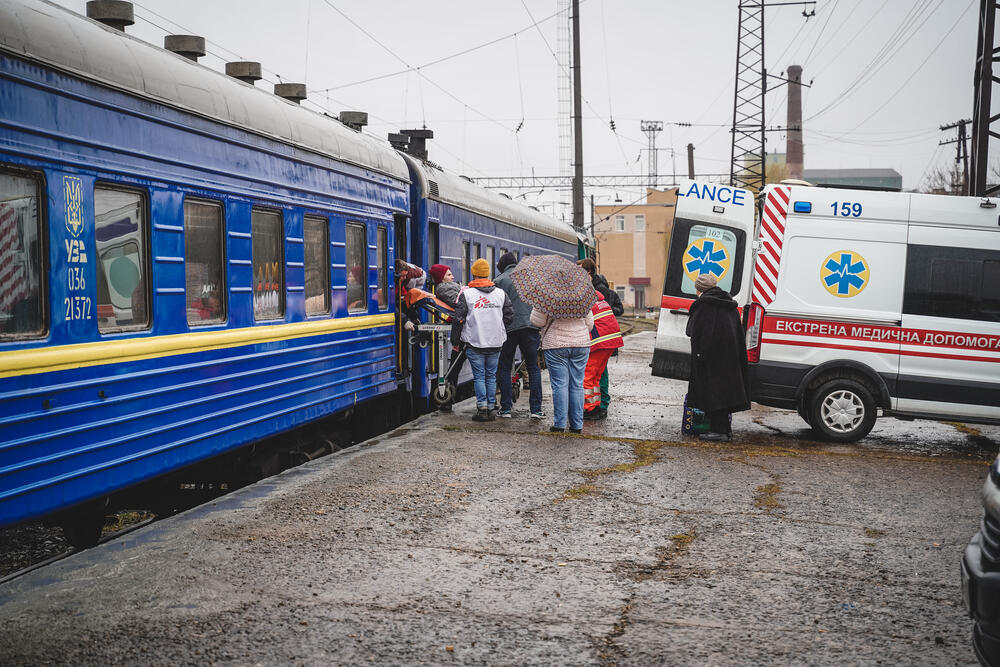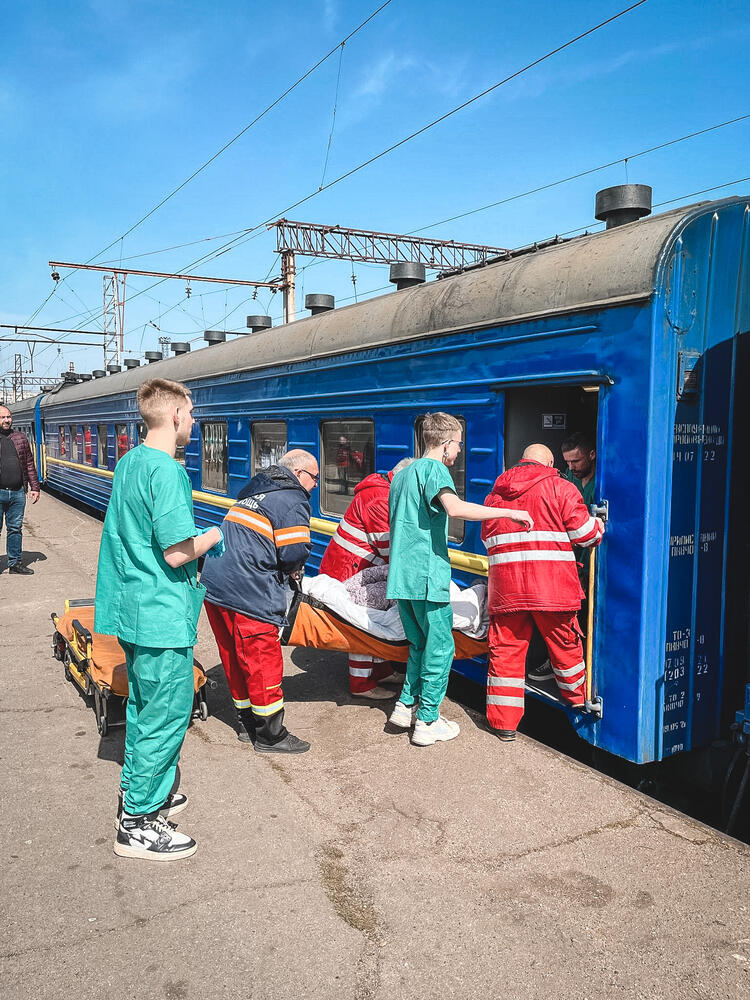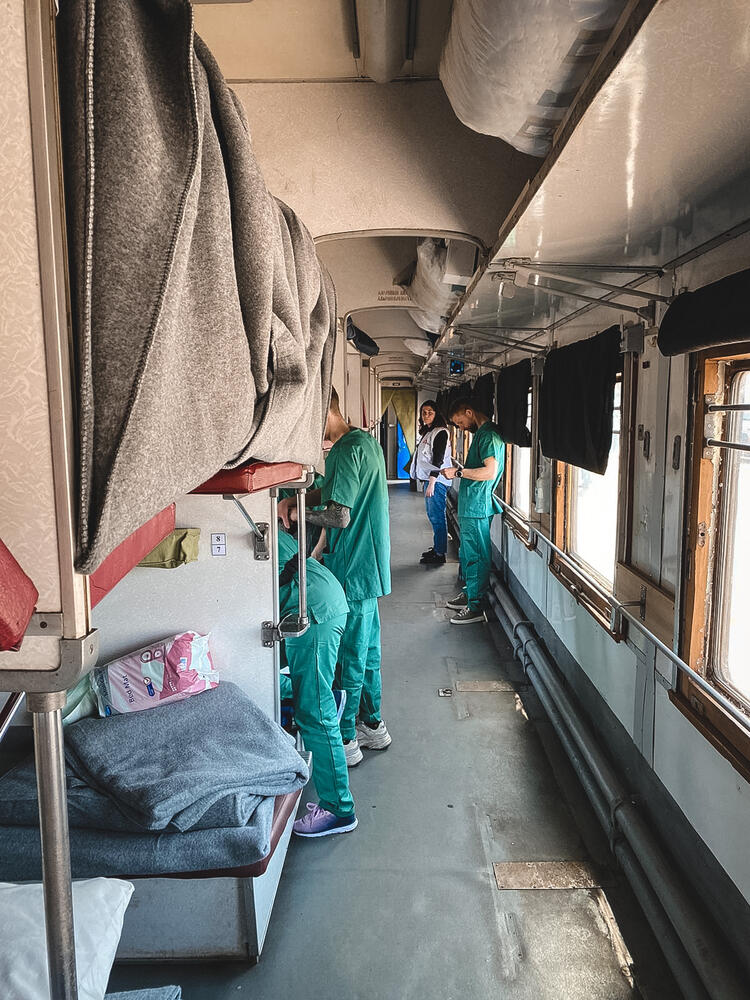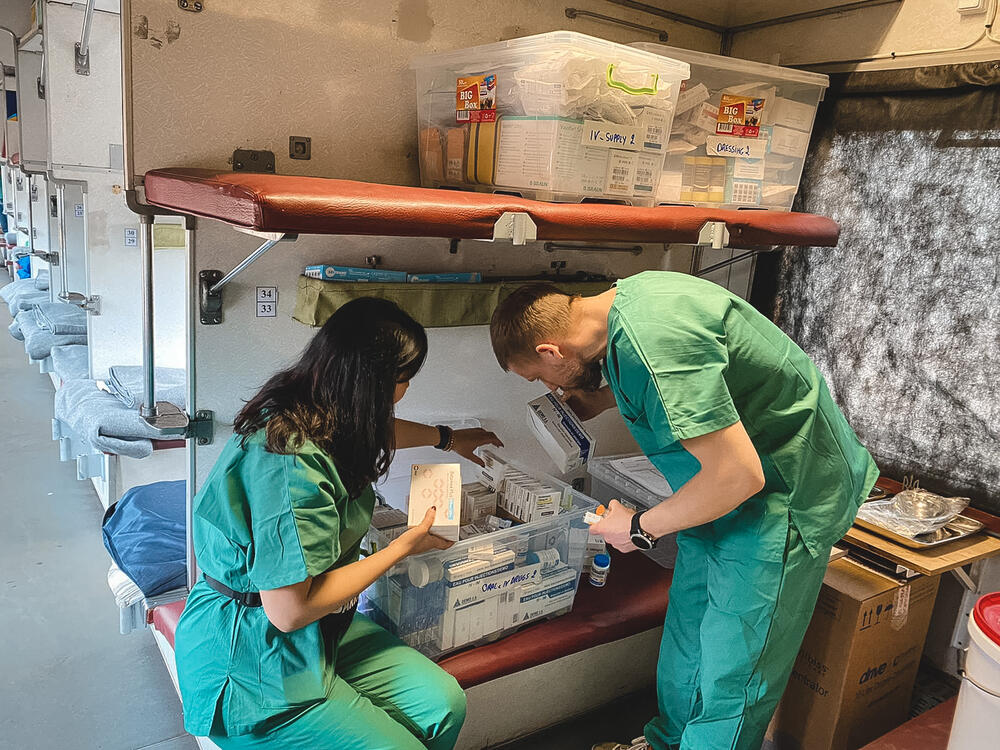“You need to get them out of here”: On board MSF’s medical evacuation train in Ukraine
On the morning of Friday 1 April, a team from Médecins Sans Frontières / Doctors without Borders (MSF) departed with nine patients on board its first 'medical train' in Ukraine.
The patients, all in serious but stable conditions, were transferred from a hospital in Zaporizhzhia, in the southeast of Ukraine, to major referral hospitals in Lviv in the west of the country.
This was done via a dedicated two-carriage medical referral train that MSF has developed together with the Ukrainian Railways. The patients were accompanied by a team of nine medical staff. This short medical train is the first service to be launched, while a larger and more highly specialised train is developed by the MSF team.
Dr Joanne Liu, a paediatrician working with MSF’s medical response in Ukraine, reports on her experience of evaluating patients and making sure they were stable enough for the long but life-saving journey ahead.
On Tuesday 29 March, we visited Zaphorizhzhia and met the regional health director. We said we wanted to hear from him and find out if there was anything he needed from us.
He said he’d heard a story about a train for medical transfer and that he was very interested – he had patients who needed to be referred.
We said: OK – let’s go and see your patients.
“You need to get them out of here”
Most of the patients we saw had been wounded in, or while trying to escape from, Mariupol – the under-seige port city in the southeast of the country.
One young patient had large open fractures, and both their legs were being treated with vacuum drainage – a procedure used to help wounds heal faster. Fairly stable, but a very sick child.
Of course, it makes sense to offload hospitals that are close to the frontline to enable them to have more bed capacity. But we needed to make sure we’d be transferring the patients to somewhere where they would get the same level of care, if not a higher level of care.
We just wanted to make sure this would be safe for everybody.
We talked with some parents to ask if they wanted medical evacuation for their children or not.
The first mother said: “I want my child to be medevaced because I think it is the only chance for my child to keep his legs.”
Then the child looked at us and said: “I want to walk again”.
By then it was the end of the day and we had to leave to be able to pass checkpoints.
So, we said we cannot promise anything but we’ll see what’s possible.
The hospital director and many of the interns were there. They were insistent: “You NEED to get them out of here. They need to survive. This is our hope”.
A 20-hour transfer
The next day, three of us came back and screened every single patient.
Our key point for each patient was was to consider:
Could this person sustain a 20-hour transfer when we don’t have ICU [intensive care unit] level of care on this short medical train?
Finally, on Thursday 31 March, we came back early in the morning to do another check on all the patients before undertaking the referral – to make 100 percent sure they were stable.
There was one patient, a three-year-old child with very severe abdominal injuries, who we thought would not be stable enough for the transfer.
At one stage, the mother said: “My child is going to die during the transfer.”
I’ve been a practising paediatrician for the past 30 years, and what I told everyone is that when a mother tells you that... she’s never wrong.
We had evaluated this child three times, together with the directors of the hospital.

Help us prepare for the next emergency
That Thursday morning, the doctors were about to take the child back into the operating theatre and we all came to the same conclusion; this child is not stable enough for the transfer.
This decision took time, but it was a decision we all took together
Can I donate to support MSF's work in Ukraine?
Thanks to the generosity of people like you donating to our general funds, we haven't needed to launch an appeal for our work in Ukraine and surrounding countries.
Please consider giving an unrestricted donation, which will give our medical teams across the world the valuable flexibility to respond as needs arise.
Visit the following page to learn more.
Please visit the following link should you wish to donate to our general funds.
In particular, I recall a woman who had a blast injury to her face and had lost her right eye.
We had asked her to send us a picture on the Tuesday, as we wanted to assess her condition and we had to leave that evening to get back before the curfew. However, at first, instead of sending us a picture of the wound she sent us a picture of herself before the injury.
When we got back to the hospital the next day, the first thing she told us was: “I want to be beautiful again. For my husband. For my child.”
These stories are from just a few patients – but they are the stories of many thousands of people.
The dedication I saw was amazing.
For example, when we started the transfer to the train on Thursday morning, the ICU physician – the most senior staff member on the ward – came and did the transfer himself.
He paid great attention to the boy with the severe leg injuries. It was he who lifted the stretcher onto the train, and then waited there a while to check the patient was fine.
And, when he was finally satisfied, he looked at me and said: “I think my job is finished now. I hand over to you.”
MSF and the war in Ukraine
Fighting in Ukraine has killed or injured thousands of people, while an estimated four million refugees have fled to neighbouring countries.
Médecins Sans Frontières / Doctors Without Borders (MSF) teams are working to deliver emergency medical aid to people still in Ukraine, as well as those now seeking safety in neighbouring countries.




